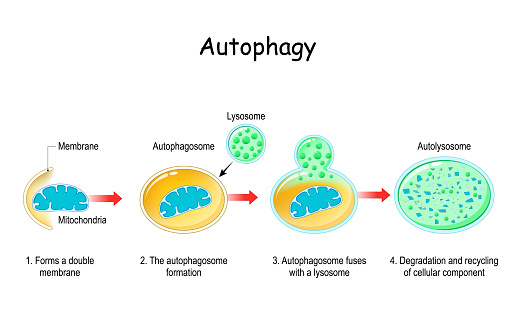Eating for Ketosis & Autophagy
Steven Goldring, RPh of Simple Hormones
Your brain health is linked to many things including diet! One of the biggest factors known to lead to dementia is insulin resistance. Alzheimer’s is the inability of the brain to utilize glucose, and is often referred to as “type 3 diabetes” due to the number of similarities it shares with type 2 diabetes. Because glucose plays such a major role in dementia, eating a diet that reduces the amount of glucose available in our bodies can help encourage brain health and decrease the risk for dementia. Introducing a diet change such as “Keto” or a modified version of Keto can help reduce carbohydrates, reduce blood glucose, and reduce insulin. By limiting the amount of glucose being introduced to the body, you can stimulate the use of ketones to produce energy instead of glucose.
What is Ketosis?
According to WebMD Ketosis is a process that happens when your body doesn’t have enough carbohydrates to burn for energy. Instead, it burns fat and makes things called ketones, which it can use for fuel.
Ketosis is a word you’ll probably see when you’re looking for information on diabetes or weight loss. Is it a good thing or a bad thing? That depends.
Ketosis can have some benefits beyond weight loss including brain health. Doctors may put children who have epilepsy on a keto diet because it can help prevent seizures. Adults who have epilepsy sometimes eat modified Atkins diets.
Ten signs you are in ketosis
When your ketone levels are elevated, you’re considered to be in ketosis. Common signs can include changes to your breath, appetite, or energy levels.
- Bad breath: A common side effect of reaching full ketosis.
- Weight loss: Keto diets, along with other low carb diets, are highly effective for weight loss.
- Increased ketones: One of the hallmarks of a keto diet is a reduction in blood sugar levels and an increase in ketones in the blood, and in breath and urine.
- Appetite suppression: Many people report decreased hunger while following a keto diet.
- Increased focus and energy: Long-term keto dieters often report increased focus and energy once the initial “keto flu” passes.
- Short-term fatigue: These side effects are natural. After several decades of running on a carb-heavy fuel system, your body is forced to adapt to a different system.
- Digestive issues: A keto diet generally involves a major change in the foods you eat. Digestive issues such as constipation and diarrhea are common side effects in the beginning.
- Insomnia: Poor sleep and insomnia are common symptoms during the initial stages of ketosis. This usually improves after a few weeks.
What is Autophagy?
Autophagy is a natural, self-preservation mechanism whereby the body removes damaged or dysfunctional parts of a cell and recycles other parts toward cellular repair.
Autophagy is the body’s way of cleaning out damaged cells, in order to regenerate newer, healthier cells, according to Priya Khorana, PhD, in nutrition education from Columbia University.
“Auto” means self and “phagy” means eat. So the literal meaning of autophagy is “self-eating.” The purpose of autophagy is to remove debris and self-regulate back to optimal smooth function.

Ketoflex for brain health
In his video (below), Steven Goldring introduces a modified Keto diet referred to as KetoFlex, which decreases the amount of carbs to encourage ketosis, emphasizes whole foods as opposed to packaged and processed foods, increases the amount of healthy fats in your diet, and reduces toxins being introduced to your body and brain. Unlike the well-known Keto diet, KetoFlex prioritizes decreasing the risk of dementia and therefore emphasizes avoiding unhealthy fats such as processed meats, seed oils, and vegetable oils, and encourages a diet structured around intermittent fasting. Intermittent fasting leads to autophagy, which can be described as your body “taking out the trash” on a cellular level and allows.
To learn more about how eating for ketosis and autophagy can benefit your brain health, watch Goldring’s video, “5 Minute Action Steps to a Healthy Brain: Eat for Ketosis and Autophagy”.
Interested in learning more from our experts? Book your FREE consultation today or call 406.869.1066!




